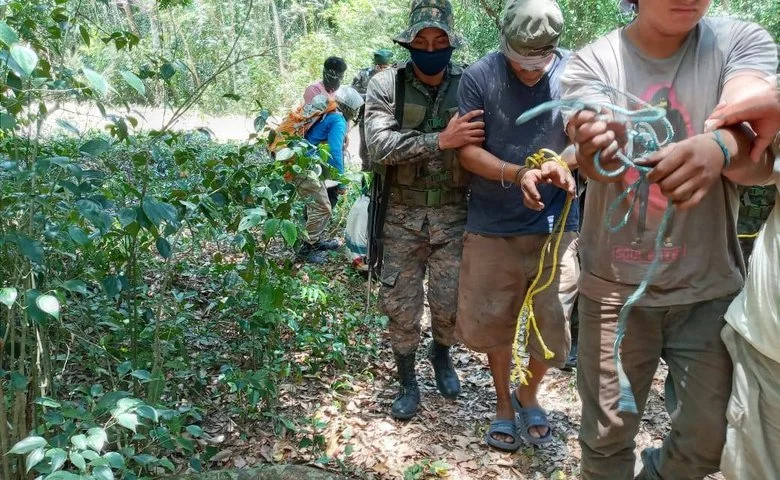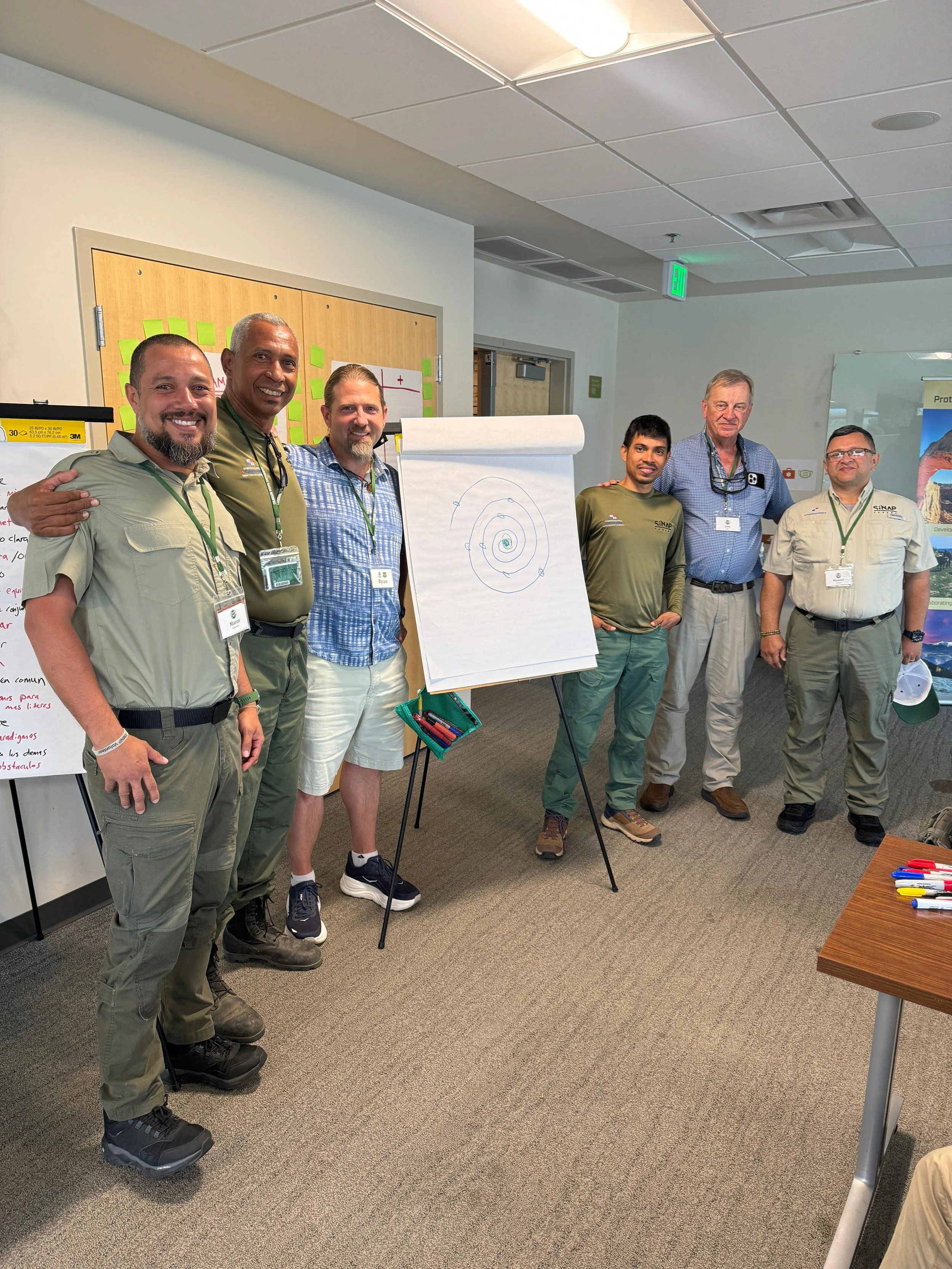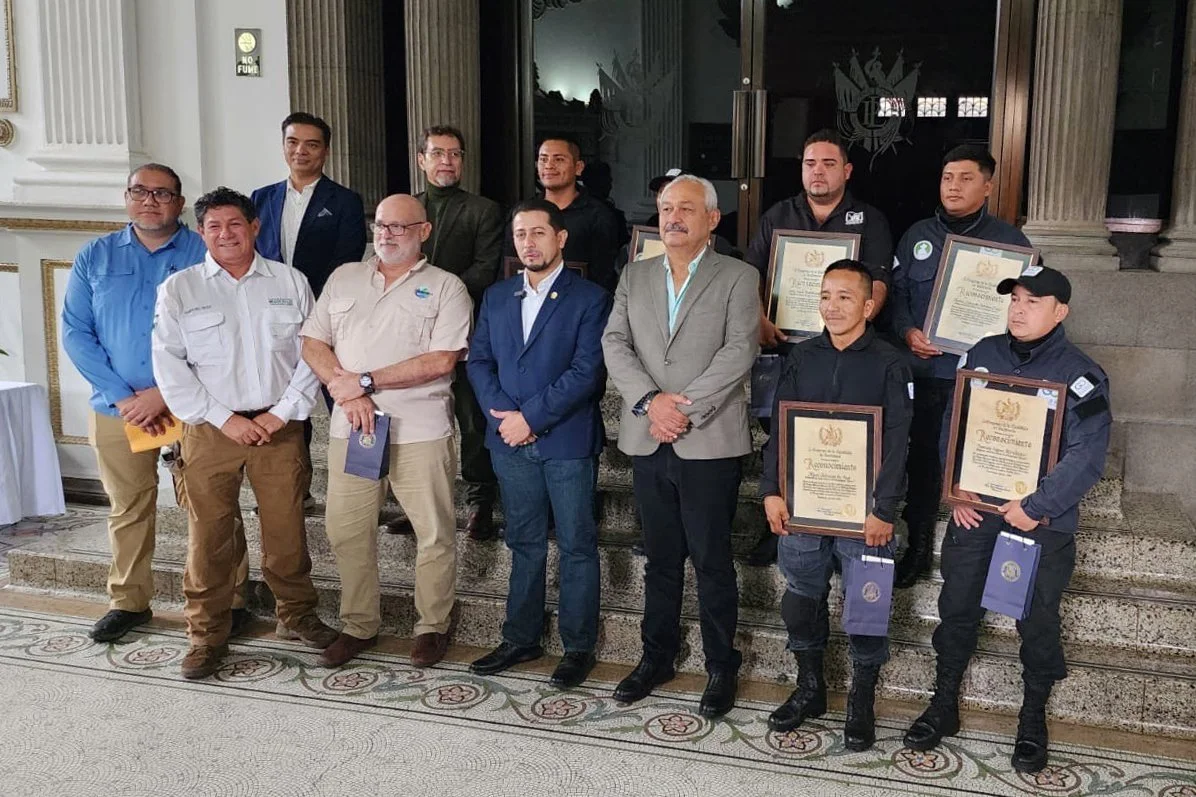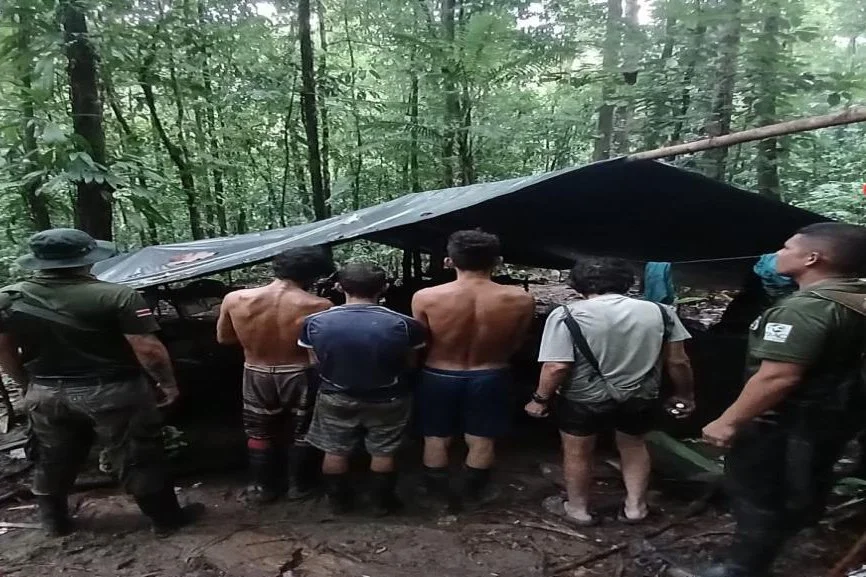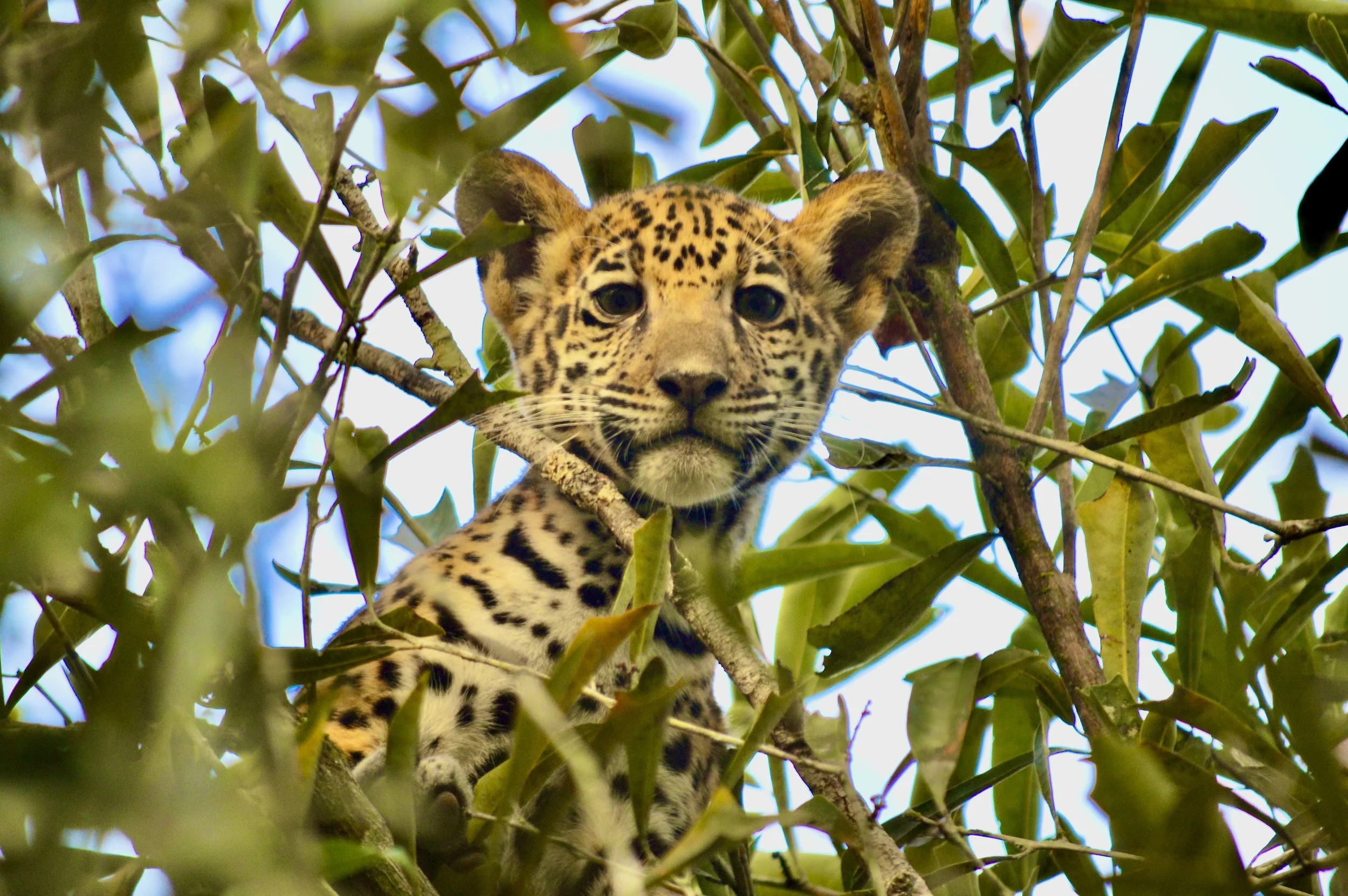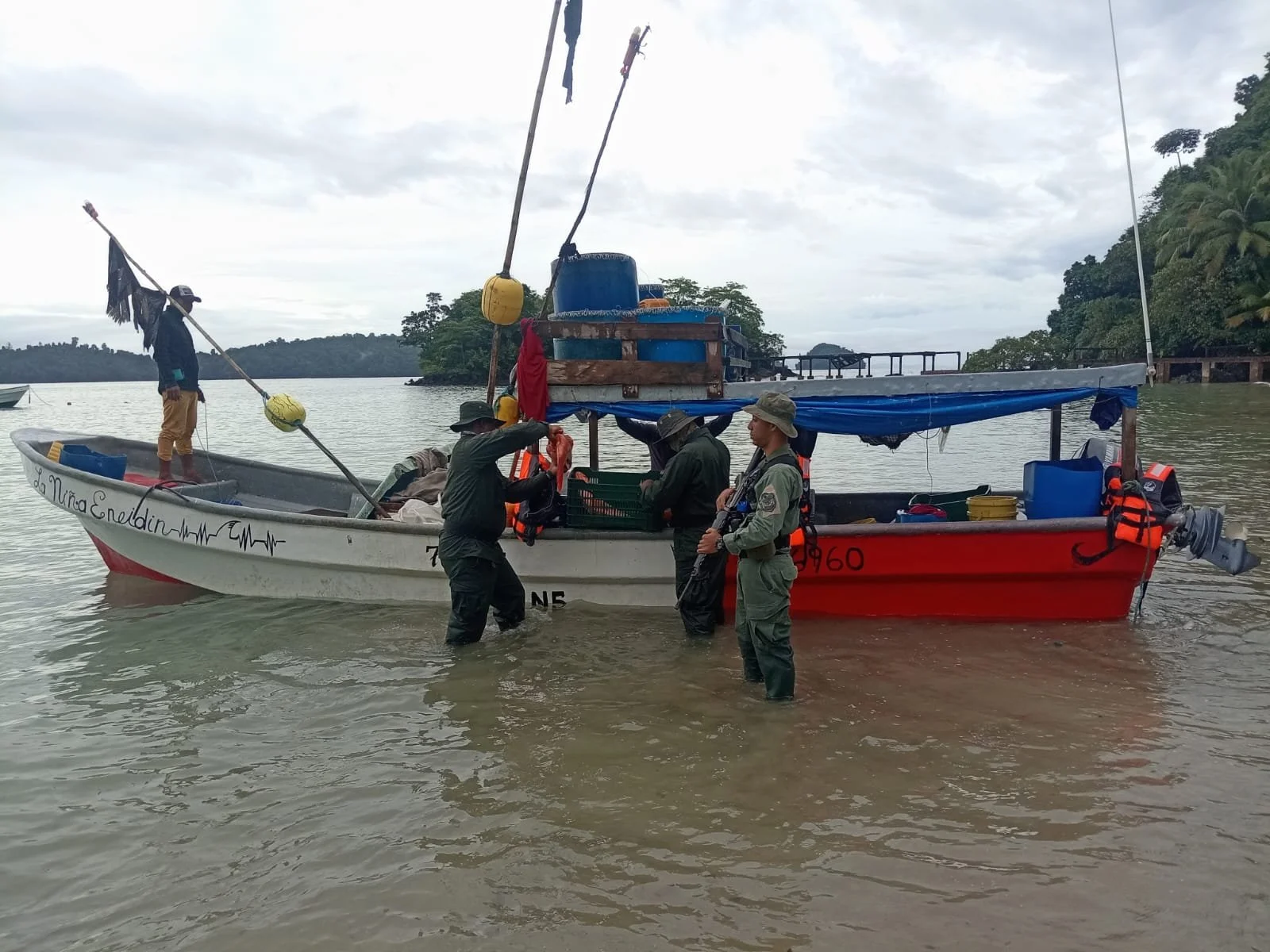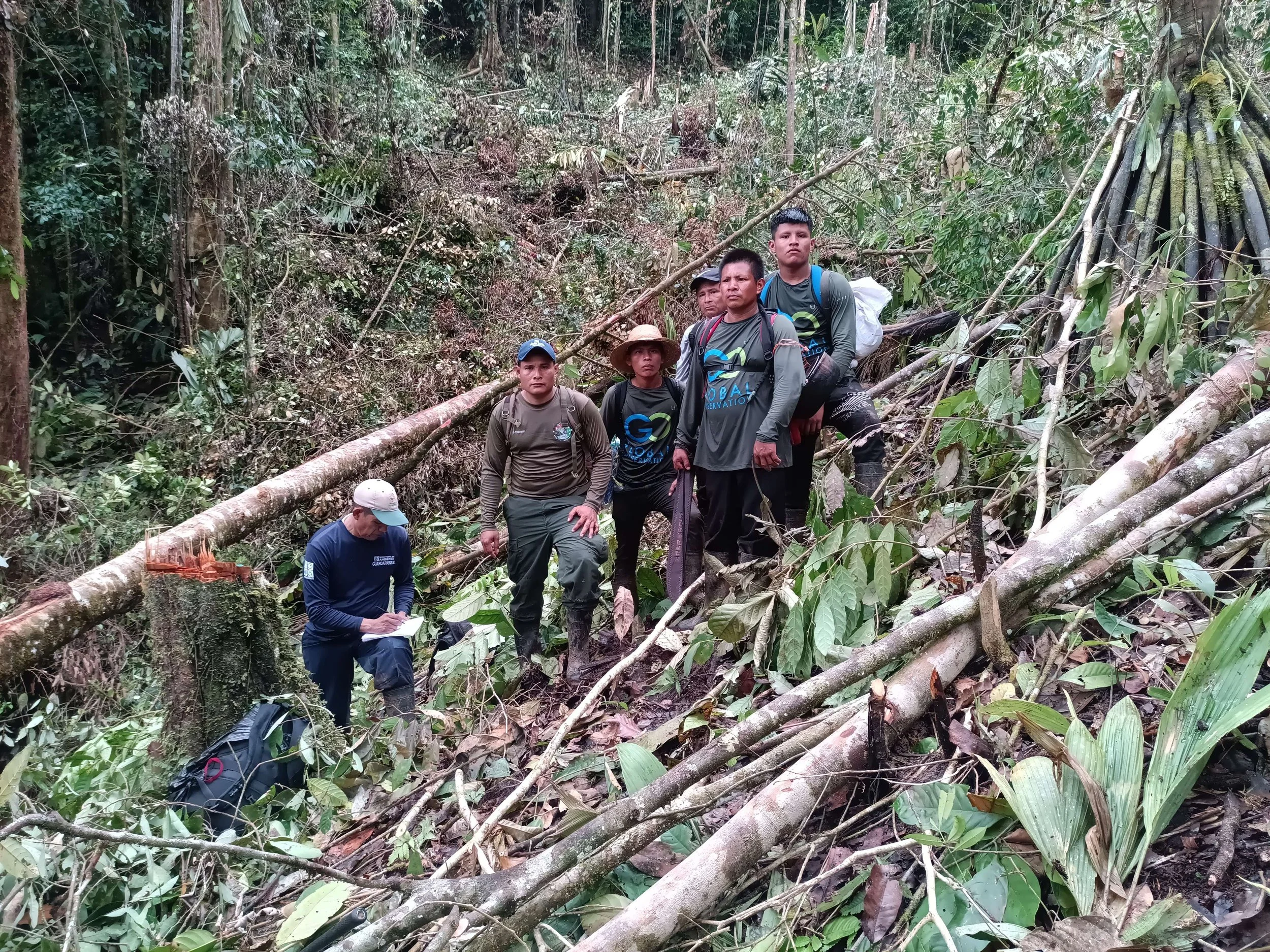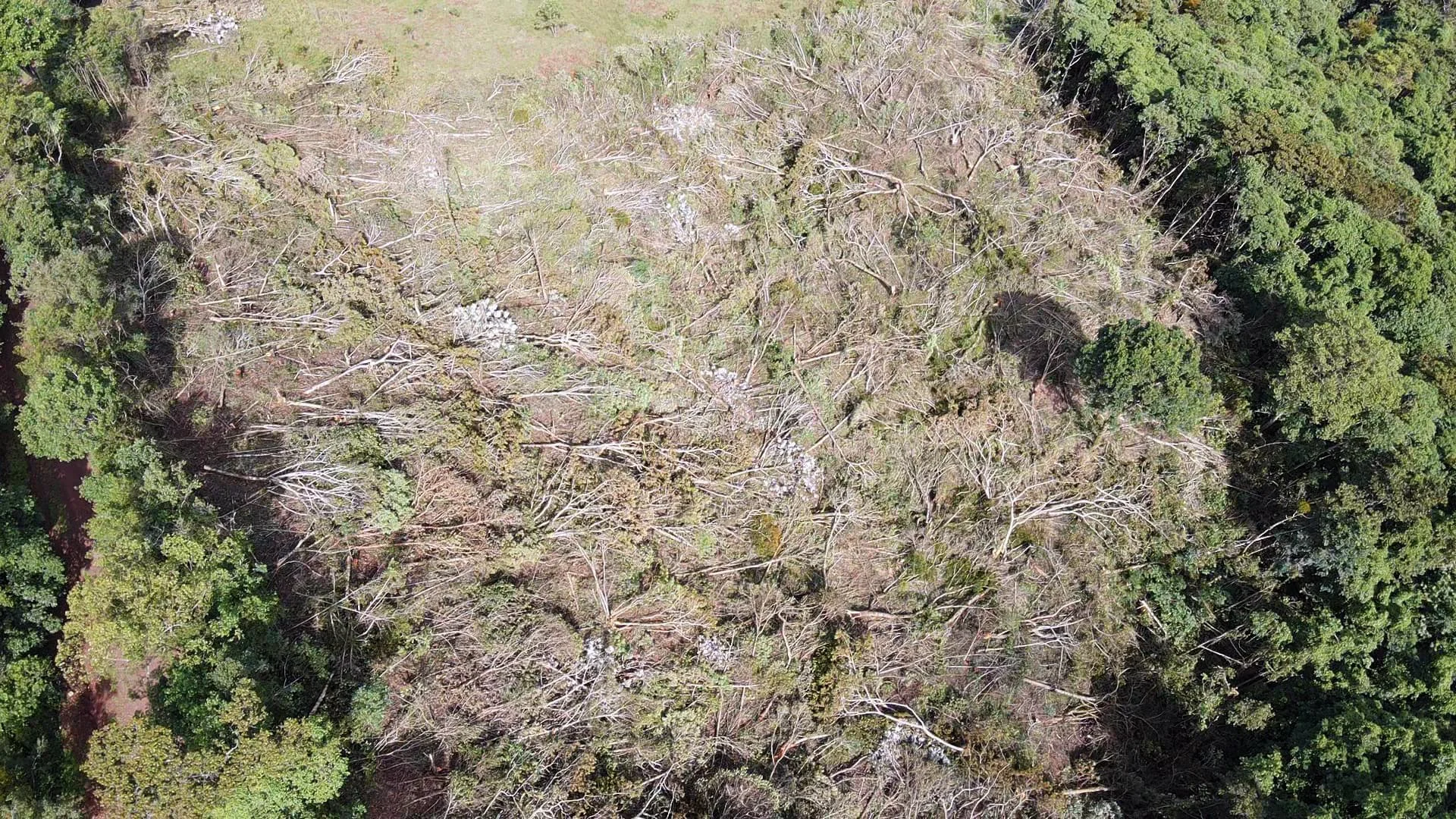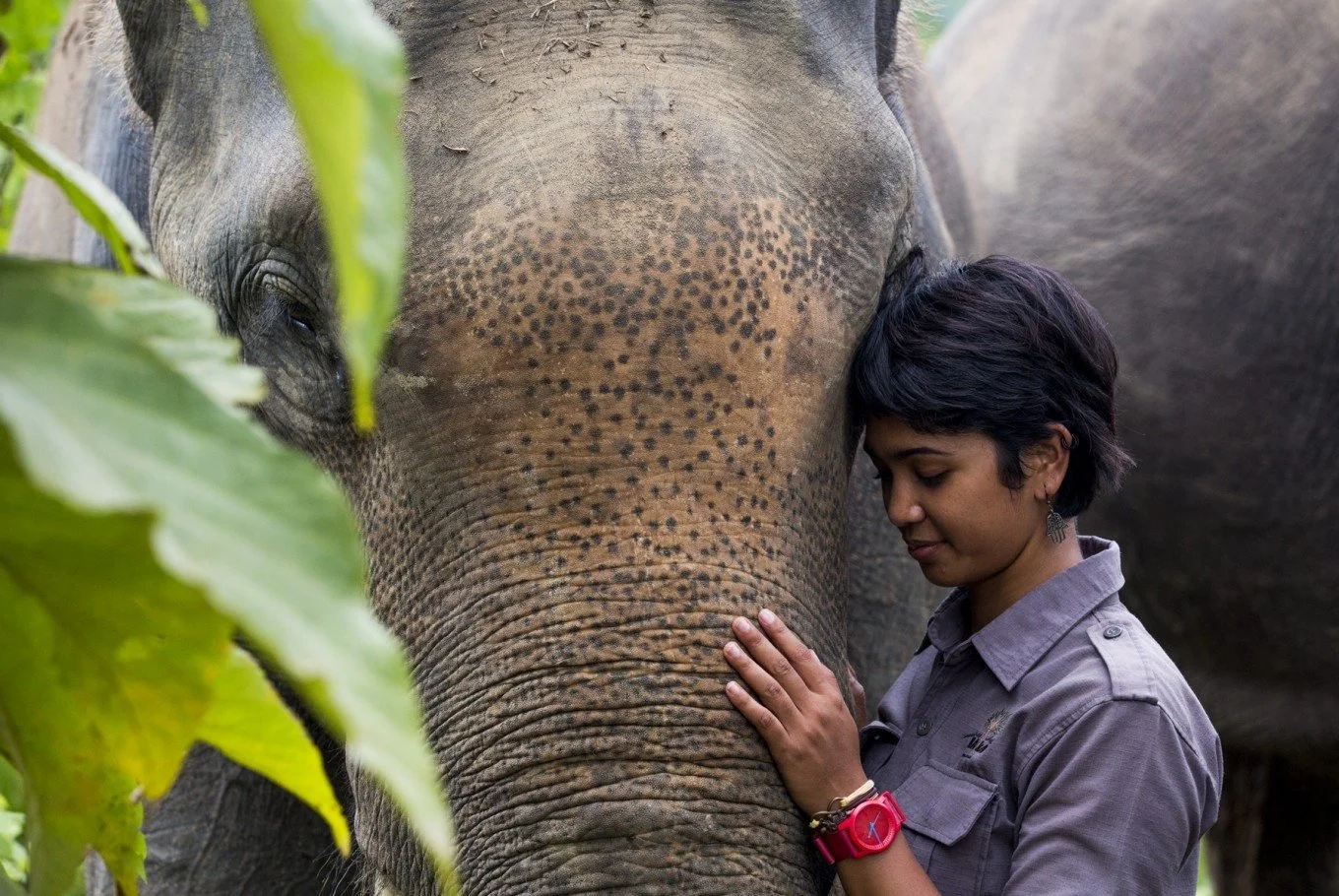Mirador National Park 2022-2023 Progress Report
Global Conservation is working to secure permanent protection for Mirador National Park in Petén, Guatemala – the Heart of the Maya Biosphere and the Cradle of Maya Civilization. Mirador National Park and the Mirador Wilderness Area are composed of Biotopos Dos Lagunas, Selva Maya and El Zotz, which together comprise the largest intact tropical forest in Mesoamerica (an area that spans central Mexico south to northern Costa Rica).
Mirador National Park also boasts over 40 major ancient Maya cities, immense temples and pyramids, and hundreds of miles of interconnected Mayan causeways, all in an area larger than Yellowstone.
The vast, uninterrupted rainforests of Mirador, with La Danta pyramid in the foreground.
Mirador is a critical site not only for the conservation of biodiversity, but also cultural heritage. The archaeological importance of this site was emphasized in 2021 when a 3D LiDAR survey led by Dr. Richard Hansen revealed thousands of ancient structures in 25 major cities across the landscape.
La Danta pyramid is the largest pyramid by volume in the world.
Unfortunately, deforestation continues to threaten the Maya Biosphere Reserve, and its archaeological sites are threatened by looting and development. With Global Conservation’s support and matching funding from Rainforest Trust, the private nonprofit FundaEco has been working hard to stop illegal activities in Parque Nacional Mirador – Rio Azul (Mirador-Rio Azul National Park) and surrounding areas.
Fires are intentionally set by people who are illegally clearing the rainforest to make way for cattle ranching, which supports narcotrafficking.
"Thanks to the efforts of our field staff (park rangers), administrative staff, technical staff, government organizations (CONAP and CECON) and especially our national and international donors, we managed to reach, well above expectations, the goals we had proposed for 2022-23."
- Francisco Asturias, Director of FundaEco Petén
These efforts are being led by Francisco Asturias, Director of FundaEco Petén and the Mirador Park Rangers. These rangers are a combined team of government police and military, NGO-trained rangers, and community Ecoguards working together to stop wildlife poaching, looting of archaeological sites, illegal logging, and land clearing for cattle ranching.
This land clearing is especially contentious because it supports narcotrafficking by providing a medium for money laundering, drug smuggling, and territory control.
Map showing threats detected by the SMART system in Mirador National Park.
Key Achievements, 2022
In the past two years, Asturias and his team have achieved the following:
Mirador Patrols: over 57,501 km traveled across 1,187 patrols in 2022.
International Collaboration: in collaboration with Mexican authorities, Mirador Rangers and Community Ecoguards patrolled with Guatemalan Army and Police, closing down a major illegal logging syndicate working inside Mirador National Park. Mirador Rangers also collaborated with the Guatemalan army, Guatemalan park rangers, firefighters from Calakmul, Mexico, and volunteers to construct a firebreak along the border between Mexico and Mirador.
Arrests and Citations: 62 crimes have been identified and arrests made in 52 cases in 2022. Twenty-two loggers were captured, and their equipment and a truck were seized.
New Vehicles: GC funded the purchase of a truck, two motorcycles, a trailer and five ATVs for patrolling. We also funded tires, repairs and maintenance on six ATVs.
Jaguar and Wildlife Studies: FundaEco deployed trailcam networks for estimation of predator and prey populations.
New US Government Support: US Senators have proposed a $50 million, 5-year Senate Bill for community-based park and wildlife protection (S3131), with the potential for another 5-10 year renewal.
Ranger Training: Both on-the-job and classroom training was conducted. Further, two Mirador rangers attended a two-week park management training at Colorado State University.
New UNHCR Funding: 47 new rangers were hired and trained, funded by the UN High Commission for Refugees. Among those, twelve new Genesis Team Rangers were added, growing our team to 18 rangers beginning in 2022.
SMART trainings: With GC's support, 72 Guamtelan rangers have been trained in SMART. Additionally, FundaEco helped train 20 rangers from Panama, 10 from Costa Rica, and 16 from Belize in the SMART system, with GC's support.
Infrastructure: With GC's support, FundaEco constructed the Selva Maya Command Center, a bungalow, kitchen and trail system at Dos Lagunas, and a dormitory for rangers.
Law Enforcement
FundaEco spent three years training a special ranger team to carry out patrols with the army (Ministerio de la Defensa Nacional) and the police, as well as permanently patrolling the entire Mirador area using the SMART patrol system.
Jaguars are one of the species that poachers target in Mirador.
In total, between June 2022 and June 2023, 62 crimes were identified, with arrests made in 52 cases. Twenty-two loggers were captured, and equipment and a truck were seized.
In 2023, Mirador Park rangers patrolled more than 57,501 km during 1,187 patrols, and identified 62 crimes in the area. Thirty-two of those patrols (1,664 km) were conducted jointly with the Guatemalan army.
Poachers caught on camera trap in Mirador.
Global Conservation and FundaEco Peten have also recently begun collaborating with the University of Guatemala to offer additional protection to Biotopo San Miguel La Palotada El Zotz, a protected area along the southern edge of the Maya Biosphere Reserve. It forms an important barrier between the protected forests and the lands further south that have already been converted to farming or ranching, making its protection paramount to the continued protection of the Selva Maya.
However, El Zotz is surrounded by illegal cattle ranches, making it vulnerable to the fires that the ranchers use to clear the forest. Francisco Asturias, Director of the Mirador Park Rangers, is coordinating this effort to offer additional equipment and training to El Zotz personnel.
In 2022, GC supported the purchase of a 4x4 pickup truck, fuel, and food for rangers in El Zotz. One person was arrested and sent to jail for illegal activity in the area.
"Thanks to the support of Global Conservation, CECON park rangers have been supported in the El Zotz biotope. It is extremely important to protect the Zotz as it is one of the most threatened fronts of the Mayan biosphere."
- Francisco Asturias, Director of FundaEco Petén
International cooperation between Guatemalan and Mexican authorities is crucial to save Mirador.
International Cooperation
The humid air and moist soils of the Selva Maya rainforests have historically protected the forest against devastating wildfires. Recently, however, they have begun to occur around the forest’s edges, as human populations set the land ablaze in order to clear it for farming or ranching. Last year, a wildfire crossed from southern Mexico into Guatemala’s Parque Nacional Mirador – Río Azúl. Fortunately, it was put out by the Mirador Park Rangers within two days, before it could cause major damage.
The wildfire that was put out within two days in 2022 by the Mirador Park Rangers.
The site of the fire, one year later, showing many dead trees.
Due to incidents such as these, Global Conservation and FundaEco Peten recently collaborated with Mexican officials to construct a 7km-long firebreak along the border in March 2021. More than 70 people were involved, including members of the Guatemalan army, Guatemalan park rangers, firefighters from Calakmul, Mexico, and volunteers. This firebreak will prevent such devastating fires from crossing into the park in the future.
Volunteers work to clear the firebreak between Mirador National Park, in Guatemala, and Calakmul, Mexico.
Volunteers, rangers and soldiers from both Guatemala and Mexico walk along the newly cleared firebreak.
Illegal logging of hardwoods on the Mexican-Guatemalan border has been a persistent problem. FundaEco is collaborating with Calakmul Biosphere Reserve authorities, just across the border in Mexico, to address this issue and other transboundary concerns. Collaboration between Guatemala and Mexico is crucial for protecting the Selva Maya, a transboundary ecosystem that, of course, does not stop at a national border.
A meeting between officials from Calakmul, Mexico, and Mirador, to establish protocols for cooperation.
Fortunately, an international partnership between Mexico and Guatemala has allowed for joint patrols in recent years, bolstering efforts to halt cross-border crimes like illegal logging and narcotrafficking. In 2023, Rangers closed down a major illegal logging syndicate, arresting seven illegal loggers and seizing illegal logging equipment and a truck.
"Without a doubt, the greatest achievement in Control and Protection is that from 2022-23, illegal loggers have not entered Guatemala from Mexico to cut more trees. This is thanks to the actions of the Genesis group and the constant patrols carried out by the park rangers. In Mexico they are still cutting to date."
- Francisco Asturias, Director of FundaEco Petén
Mirador Park rangers lead illegal loggers, allegedly part of a Chinese syndicate, out of the forest. Photo courtesy Francisco Asturias.
Ranger Training
Both on-the-job and classroom training was conducted this year, and two Mirador rangers attended a two-week park management training at Colorado State University.
With more than three years of training, new ranger stations, vehicles and equipment, a special team of rangers has been formed who carry out patrols with the army and the police, as well as permanently patrol the entire area.
Mirador Park rangers have now been trained in, among other things:
The SMART Patrol system
Protected areas management
Fighting forest fires
Biological monitoring
First aid
Garmin InReach GPS system
Self defense
Trail and camp maintenance
Visitor safety and security
Assisting community tourism cooperatives
Items confiscated during an arrest, including fish caught illegally within Mirador National Park and a poached bird.
New Ranger Transport and Equipment
GC has provided support through FundaEco to purchase new equipment and supplies for Mirador law enforcement.
Global Conservation funded new bulletproof vests for rangers.
FundaEco has increased the number of vehicles available for transportation of rangers and the army by 270% and ensured that ranger teams are properly equipped with the materials needed for long and difficult patrols.
New vehicles and equipment were purchased, including a truck, two motorcycles, a trailer, and five new ATVs for patrolling. Global Conservation also funded new tires, repairs and maintenance on six ATVs.
Patrol conditions are often extremely difficult, making ATVs and 4x4 vehicles an absolute necessity.
Global Conservation donated this 4x4 truck to assist the Mirador Park Rangers with their patrols.
"We patrol more than 2 thousand kilometers a month. Unfortunately, the governmental organizations that are in charge of the administration of Mirador National Park and Biotope Dos Lagunas don't have enough transportation equipment to transport rangers to camps or to patrol sites. Thanks to the modified truck and the five ATVs that Global Conservation has donated, we can accomplish all of our objectives."
- Francisco Asturias, Director of the Mirador Park Rangers
Complete camping kits, including two generators, were purchased to support rangers while at base camp and on patrol.
Scientific Monitoring
FundaEco collaborated with the University of Guatemala Centro de Estudios Conservacionistas (CECON) and the University of Mexico (UNAM) for more than two years to monitor jaguar populations in Mirador-Rio Azul. Scientific monitoring teams installed 30 camera traps across a 100km transect. All of those cameras captured images of jaguars.
Through this work, FundaEco has discovered that this area contains the densest jaguar population in Mesoamerica, and likely the largest jaguar population north of the Amazon.
Scientists place a camera trap to monitor wildlife in Mirador.
In 2020, FundaEco began another round of jaguar monitoring across the entire Selva Maya in collaboration with WCS, UNAM, and with GC's support. This new study involves more than 110 camera traps, making it the largest jaguar monitoring study ever undertaken in Central America. They are currently awaiting the results, which will be important for comparing to baseline data in order to understand how effective conservation efforts are in the region.
A jaguar photographed by a camera trap in Mirador.
Additional scientific equipment has now been purchased and deployed for estimating predator and prey populations. This is one of the largest wildlife monitoring programs in all of Mesoamerica, covering over a thousand square kilometers using 100 camera traps.
The team prepares to deploy new camera traps.
New Potential Major US Government Support
Based on our lobbying and advocacy, US Senators have proposed a $50 million 5-year Senate Bill for community-based park and wildlife protection (S3131), with potential for a 5-10 year renewal.
The Guatemalan Congress and President support US Senate Bill S3131.
Outreach and Education
In addition to law enforcement and scientific monitoring, FundaEco is working on community outreach and education. They have sponsored health clinics that have treated more than 500 cases since December 2018, as well as producing a kids’ coloring book, delivering school supplies to local children, and staging environmentally-themed plays as a medium for environmental education.
FundaEco reaches communities in part through providing school supplies (left), producing conservation coloring books (right), and producing nature-themed plays that are put on by local children.
Further, FundaEco has constructed a ranger camp and tourist information center in a strategic location to stop illegal activities on the main trails.
The new tourist information center.
The new ranger station.
Finally, recognizing the importance of international collaboration and exchange of knowledge and expertise, FundaEco has participated in the following international meetings:
Global Conservation Board of Directors meeting
Calakmul Biosphere Reserve authority meeting, Mexico
Joint meeting among Belize, Mexico and Guatemala
Jaguar Symposium, Cancun, Mexico
Sierra del Divisor National Park authority meeting, Peru
Corcovado and La Amistad National Park authorities meeting, Costa Rica.
A pair of pumas caught on camera trap in Mirador. Photo courtesy Francisco Asturias.
New Video, Wildlife of Mirador National Park
New video celebrating the amazing wildlife of Mirador. You can watch it above, and read the script here.
Looking Forward
2024 will be our sixth year of the Global Park Defense and Community Protection program. Our long-term goal in Mirador is to achieve “No Cut, No Kill” protection while increasing tourism revenues to benefit local communities. We also aim to achieve UNESCO World Heritage Designation for Mirador, and to expand the area of the park by purchasing neighboring forestry concessions.
Objectives
Establish permanent legal protection for the nature, wildlife and archaeological heritage of Mirador.
Assist the Guatemalan government in securing UNESCO World Heritage designation.
Negotiate trade-offs with stakeholders that will determine which lands will be integrated into the new, larger national park.
Secure larger international support for park set-up after initial five-year startup operations.
Achieve an economically sustainable protected area within the next ten years, ie. tourism revenues exceed park operating costs.
Global Conservation Senior Advisor Dr. Gerardo Ceballos with a radio-collared jaguar.
Critical Initiatives
Global Conservation is sponsoring three critical initiatives in 2024-2026:
Establishing the Mirador Park Authority – Working in close collaboration with the Guatemalan government's Consejo National de Areas Protegidas (CONAP), the Instituto Guatemalteco de Turismo (INGUAT) and local communities, we will organize a professional ranger force and park management. Mirador Park Authority integrates existing guards, experts from Tikal National Park, and local NGOs to protect Mirador National Park.
SMART Ranger Patrols - Provide wildlife anti-poaching training, equipment, rations and technical support to Mirador National Park rangers to implement SMART patrols, increasing coverage, accountability and interdictions of illegal activities.
Habitat Acquisition and New Protection for Core Wildlife Areas – There are highly important areas for wildlife habitat in Mirador. Funding land acquisitions and implementing protection networks for these core areas is the highest priority.














